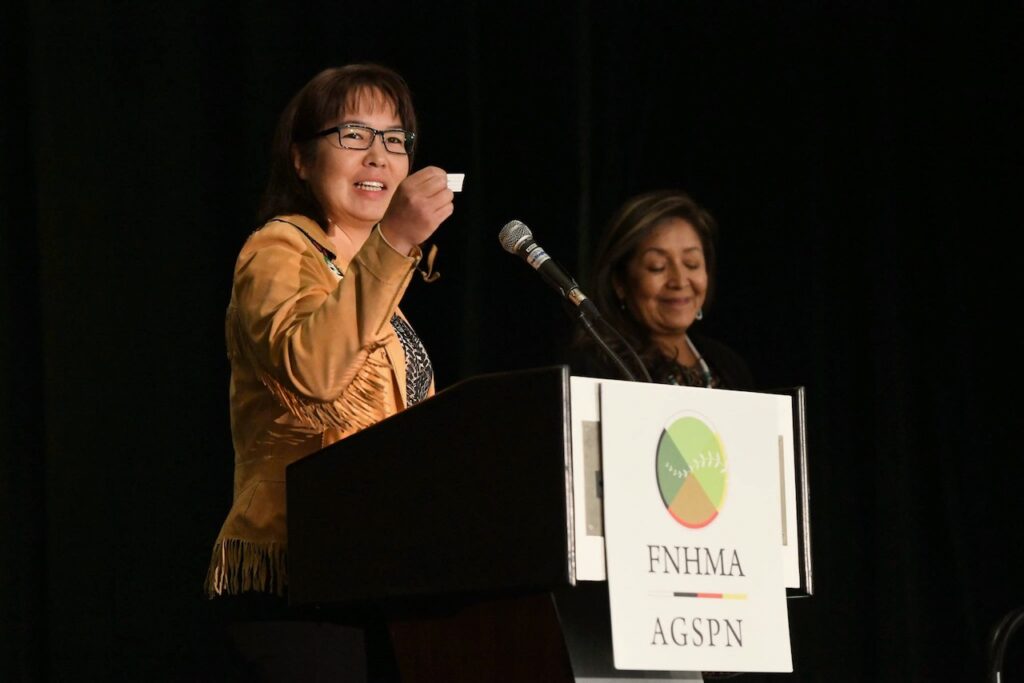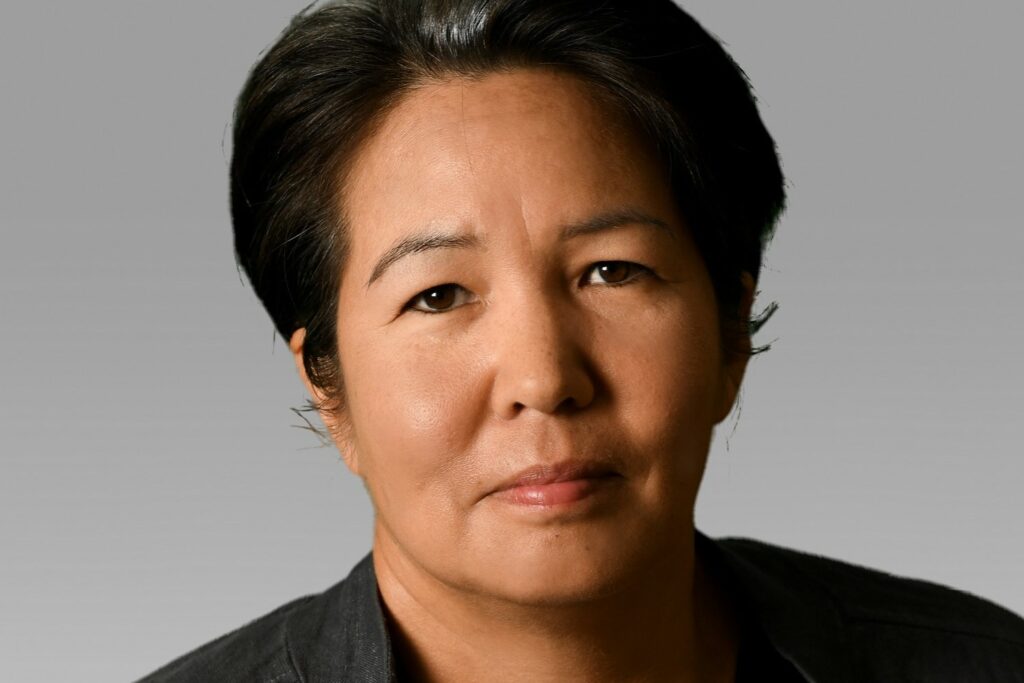Wapikoni
Wapikoni’s Story
Quebec filmmaker Manon Barbeau was deeply troubled by the suffering and high rates of suicide she had witnessed among indigenous youth in Quebec. She produced a full-length film featuring the voices of 15 youth and, in the process, formed a particularly strong bond with a young woman named Wapikoni Awashish. When Wapikoni was killed at the age of 20 by a logging truck, Manon felt she had lost a daughter. Two years later, in 2003, she decided to honour the memory of her friend.
Noting the ease and joy that came over indigenous youth as soon as they had a camera in hand, Manon partnered with First Nations of Quebec and Labrador Youth Council and the Atikamekw Nation Council to create Wapikoni Mobile, a non-profit organization that gives voice to indigenous youth through filmmaking.
Wapikoni Mobile is the only mobile studio in Canada that travels to remote indigenous communities to teach youth filmmaking techniques with state-of-the-art technology, which they use to create their own short films and musical works. Wapikoni Mobile then distributes their work, organizing 200 screenings per year at locations ranging from remote high schools to prestigious film festivals. Following the screenings, the young directors are encouraged to speak about their work, which forges new relationships between indigenous and non-indigenous people with a view towards reconciliation.
Wapikoni Mobile has also established the International Network for Aboriginal Audiovisual Creation, which uses cinema to promote respect for indigenous rights and social inclusion throughout the world. Today, Wapikoni Mobile has mentored 4,000 youth from five First Nations in Canada, and 17 communities throughout five countries in Latin America.
Though the organization has won several awards and garnered international acclaim, its success is best measured by the accomplishments of its participants, who are appearing at the Sundance Film Festival and in university classrooms, winning full scholarships at prestigious international film schools, starting the Idle No More movement, and speaking at the United Nations Permanent Forum on Indigenous Issues. Through their films they have contributed to the fight against racism, prejudice and isolation that Canada’s First Nations have suffered for generations. Wapikoni Mobile set out to engage indigenous youth living in remote communities, and in the process it has deeply enhanced filmmaking in Canada with new voices and perspectives.
Fundación Construir
Fundación Construir’s Story
Following President Evo Morales’s electoral victory, the Bolivian Constituent Assembly convened on August 6, 2006, with the purpose of drafting a new national constitution. Fundación Construir began as a panel of experts hired to advise the Assembly on how to integrate western and indigenous legal systems in the new constitution, ensuring an emphasis on the many different national groups that make up Bolivia. By enabling dialogue between politicians, judges and indigenous communities, the panel contributed to three historic articles recognizing traditional indigenous practices of law and conflict resolution.
The panel of experts became Fundación Construir in 2008, and since then it has continued helping policy-makers, judges, and indigenous communities implement the new constitution’s inclusive vision of the law, to build a pluralistic Bolivia. Construir, indeed, means “to build.” It is not an easy task. Bolivia has 36 official languages, 50 indigenous nations, and more than 2,000 different legal systems. It is a polarized country where consensus is hard to reach.
Construir works as a think tank and a convener. It produces valuable research, such as a comprehensive mapping of indigenous legal systems, and then acts as a link between the state and indigenous communities, ensuring that best practices are followed when jurisdictions work together. Construir also provides training in indigenous communities to ensure their full integration within the justice system and trains judges and other public servants to help them advance respect for traditional indigenous justice.
Construir has also helped develop the skills of hundreds of indigenous women, who now act as community leaders linking remote communities with institutions. These women have been granted the legal status of “community advocates” and have been instrumental in the fight against human trafficking and violence against women and children.
In a country with so many disparate groups and challenges, the work of Construir can be a balancing act. It is sustained by a belief in human rights and a pluralist vision of justice, one that represents every single member of Bolivia’s diverse population.
Rose LeMay
Rose’s Story
Rose LeMay is from the Taku River Tlingit First Nation in northern British Columbia, Canada. A survivor of the Sixties Scoop, the mass removal of Indigenous children from their homes and families that took place in Canada throughout the 1960s, Rose was taken from her community as a baby and raised by a non-Indigenous family. She had to figure out who she was, far away from anyone who looked like her. She experienced racism regularly. Rose came to recognize that her experience gave her a unique opportunity. She had a foot in two worlds, and she resolved to use her position to increase understanding between those worlds and to build a more pluralistic Canada so that her children would not have to experience the discrimination that she did.
Rose spent 20 years working for the Government of Canada, advocating for a more inclusive health system for Indigenous communities, with a focus on mental health. She led the development of a mental health plan for survivors and attendees of the Residential School system who were testifying at the first national Truth and Reconciliation Commission (TRC) event, and in 2016, she led the World Indigenous Suicide Prevention Conference abut culture as a protective factor, the first to be hosted in Canada.
In 2017, Rose founded the Indigenous Reconciliation Group (IRG) to provide adult education and organizational training on Indigenous cultural competence and reconciliation. The IRG raises awareness about the types of racism that exist for Indigenous people in Canada and how Canadians can work together for Indigenous inclusion—whether by ensuring that indigenous clients receive the same quality of care from frontline services providers or by supporting organizations to educate their employees about racism.
Through the IRG, Rose raises awareness via media outreach and speaking engagements. She helps organizations shift their policies and programs to support reconciliation by implementing the TRC’s Calls to Action. Rose’s courses have reached more than 5,000 people across Canada. The Government of Nunavut and British Columbia’s Ministry of Indigenous Relations and Reconciliation have sought out her trainings, with the latter engaging with IRG specifically to consult on a strategic plan to enact the UN Declaration on the Rights of Indigenous Peoples (UNDRIP).
As Rose points out, reconciliation is a journey that Indigenous and non-Indigenous peoples in Canada choose to take together, with leaders and allies and change-makers across all sectors of Canadian society pushing to do better for each other and for the country.


Canada’s Truth and Reconciliation Commission (TRC) was established in 2008 with the purpose of documenting the history and lasting impacts of the Residential School system, through which 150,000 indigenous children were taken from their communities and sent to state-funded institutions where they were stripped of their culture and severely mistreated. The TRC determined that the Residential School systems amounted to a cultural genocide of Indigenous people. In addition to guiding Canadians through the difficult discovery of the facts behind the Residential School system, the TRC was meant to lay the foundation for lasting reconciliation across Canada. In 2015, the Commission came up with 94 Calls to Action that were presented to the Government of Canada regarding reconciliation between Canadians and Indigenous peoples. In 2021, the unmarked graves of thousands of Indigenous children were uncovered across former Residential School sites. These tragic reminders of the legacy of the Residential School system highlight the gravity of the violence, the importance of this conversation and the urgency of concrete actions toward reconciliation.
Red de Intérpretes y Promotores Interculturales Asociación Civil
RED DE INTÉRPRETES Y PROMOTORES INTERCULTURALES ASOCIACIÓN CIVIL | Mexico
“This award offers an opportunity to highlight the struggles of youth in the South, racialized youth who resist the linguistic and cultural oppression of the State and its justice system. We reinvent ourselves, and we fight, together, from our territories”
Eduardo Martinez, Director-General and Legal Representative of Red de Intérpretes y Promotores Interculturales Asociación Civil
RED DE INTÉRPRETES Y PROMOTORES INTERCULTURALES ASOCIACIÓN CIVIL’S Story
A group of young interpreters steps inside a prison in rural Oaxaca, Mexico. Like everywhere in this state, the prison is extremely diverse. Many of the people behind bars do not speak Spanish; they speak a variety of Indigenous languages. This will be their first opportunity in months to converse in their own language. In some cases, the Spanish-speaking court never communicated the charges against them. With the interpreters’ support, they can ask about their legal processes, and get the latest news about their communities. Later, the interpreters will connect this group to public defenders and ensure their legal rights are respected.
The interpreters are members of Red de Intérpretes y Promotores Interculturales Asociación Civil (REDIN), a collective of Indigenous youth that strengthens access to justice for Indigenous people. REDIN provides culturally relevant Indigenous language interpretation services for Oaxacans involved in legal proceedings in Mexico and the United States.
Oaxaca is a place of tremendous linguistic and cultural diversity, with 16 registered Indigenous groups and over 177 linguistic variants. Indigenous communities in the region face structural and historical racism. To escape limited economic opportunity and marginalization, many people migrate to other parts of Mexico and the United States. This often places Indigenous groups, youth, women and gender-diverse people in dangerous situations or in contact with legal systems that fail to understand their cultural, economic and political backgrounds. Once caught up in the justice system, interpretation for Indigenous languages is severally lacking.
By training young professionals as interpreters equipped with an intercultural human rights approach, REDIN helps to guarantee the rights of Indigenous people at every step of the judicial process. Since 2019, REDIN has trained more than 120 Indigenous youth as interpreters and has assisted more than 800 Indigenous people in their judicial processes. Together with local justice institutions, REDIN produced a module for training Indigenous language interpreters in the field of prosecution and justice administration in Oaxaca.
REDIN also offers training on human rights and civic engagement to Indigenous students, and helps preserve Oaxaca’s cultural diversity by documenting oral traditions and advocating for the rights of artisans.
This network’s efforts are helping Oaxaca’s diverse population have their rights respected, their voices heard, and their cultures valued. Connecting with one of REDIN’s interpreters can change a prisoner’s life. Beyond that, REDIN is strengthening judicial systems, making them more inclusive and responsive to all of Mexico’s diverse citizenry.

